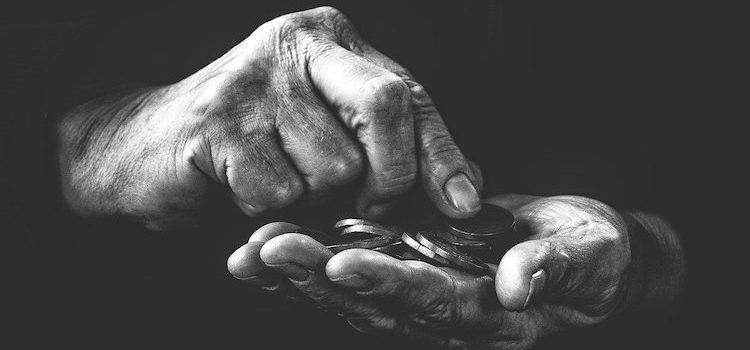

This article is an excerpt from the Shortform book guide to "The Cost of Discipleship" by Dietrich Bonhoeffer. Shortform has the world's best summaries and analyses of books you should be reading.
Like this article? Sign up for a free trial here .
What are the various religious views on poverty? How do they perceive wealth?
In the Christian classic The Cost of Discipleship, Dietrich Bonhoeffer argues that Christians should build wealth in heaven, not on earth. He asserts that earthly belongings contribute to worry, as we have more to lose. However, some religions—even other Christian traditions—disagree with him.
Continue reading to learn about various religious views on poverty.
Religious Views on Poverty
According to Bonhoeffer, disciples seek to accumulate wealth in heaven, not on earth. The first disciples left all their possessions behind to follow Christ. Moreover, in Matthew 6:19-24, Christ told his disciples, “Lay not up for yourselves treasures upon earth…but lay up for yourselves treasures in heaven…for where your treasure is, there your heart will be also…” In Bonhoeffer’s view, if you are obedient to Christ in this life, Christ will reward you with tangible wealth when you arrive in heaven. Bonhoeffer insists that “treasure in heaven” is literal wealth in the afterlife, and not merely a figure of speech, but he does not elaborate on exactly what these treasures are composed of.
[Shortform note: Other theologians have argued that the Bible does not describe heavenly treasures in detail because they are beyond our ability to imagine. They point out that the streets of Heaven are paved with gold (Revelation 21:21). Gold is one of the most valuable materials on earth, while paving materials are relatively cheap: A few gold coins would buy a truckload of asphalt and hire someone to pave your driveway with it. So what would they use as currency in a society where they use gold like we use asphalt? It’s hard to say, because that degree of wealth is completely beyond our experience.]Bonhoeffer also proposes that a life unencumbered by earthly wealth frees you from worry. Human life is full of uncertainties: History bears record of all kinds of disasters (natural and man-made) that can disrupt the economy, cause shortages of food, or bring about other hardships. Bonhoeffer observes that accumulating reserves of food, money, and perhaps other supplies seems like a natural way to protect ourselves from the uncertainties of life. However, the more wealth we accumulate, the more we could lose in the event of a disaster. So the more wealth we have, the more we have to worry about. As such, Bonhoeffer argues that it’s better to have nothing—then you have nothing to lose and nothing to worry about.
| Contrasting Religious Views on Poverty Some people disagree with Bonhoeffer’s assertion that having more wealth makes you more prone to worry. For example, secular research indicates that people living in poverty are statistically more likely to be worried than wealthy people are. Meanwhile, Christian theologians hold a variety of views, ranging from Bonhoeffer’s view on the one extreme to prosperity theology on the other extreme. Prosperity theology teaches that Christ rewards His disciples for their obedience with blessings of physical health and wealth in this life, as well as spiritual blessings in the afterlife. Islamic views on wealth and poverty are also varied. Some of Islam’s early leaders believed, like Bonhoeffer, that earthly wealth is a source of worry and temptation, and they were known for practicing voluntary poverty. The Sufi Muslim sect continues to teach this. However, the majority view among Muslim scholars is that voluntary poverty amounts to shunning God’s blessings, which is forbidden by the Quran. Very few Jews endorse the idea of voluntary poverty, because, contrary to Bonhoeffer, they believe that poverty leaves you more vulnerable to hardship, which, in turn, makes you more likely to need assistance from others. They assert that you have a moral obligation to be industrious, so that you’re not a burden to your community. Wealthy Jews are encouraged to help the poor, especially if they can help a poor Jew attain financial self-sufficiency through a gift or loan. In Buddhism and Hinduism, monks often renounce earthly wealth and possessions beyond those necessary for their monastic lifestyle. However, where Bonhoeffer argues that forfeiting your possessions frees you from worrying about them, these monks tend to reverse his logic: If you first give up your desire for material things, then losing them or giving them up won’t bother you. |

———End of Preview———
Like what you just read? Read the rest of the world's best book summary and analysis of Dietrich Bonhoeffer's "The Cost of Discipleship" at Shortform .
Here's what you'll find in our full The Cost of Discipleship summary :
- Why Dietrich Bonhoeffer believed the church made discipleship too “easy”
- Why getting into Heaven will cost you a lot more than you thought
- Bonhoeffer’s design for real Christianity






